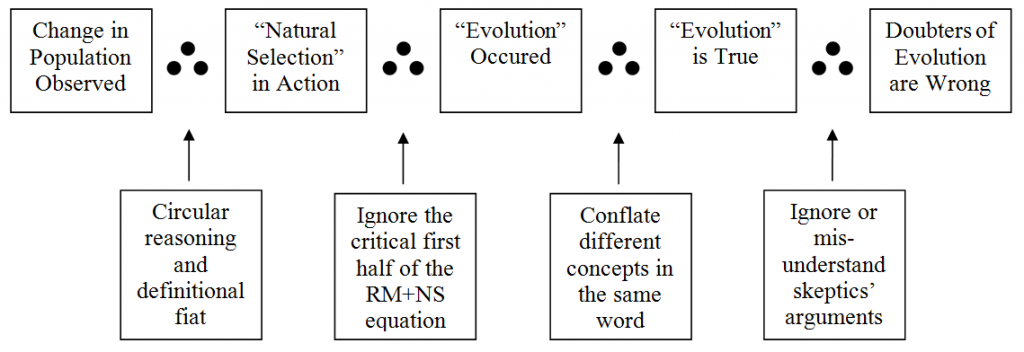One of the primary things keeping traditional evolutionary theory afloat is not the mountain of evidence supposedly existing in its favor, but the way in which the evidence is interpreted in the context of the pre-existing Darwinian paradigm.
The key is the way evolutionary theorists tend to proceed from an observation to a series of conclusions. When you are steeped in evolutionary thought, when no alternative explanations are permitted as a matter of fiat, when the only possible interpretation open to you is a purely naturalistic and materialistic explanation, the conclusions seem to follow naturally.
To paraphrase Philip Johnson’s wry (and somewhat sarcastic) observation:
Evolution is really easy to prove. Since “evolution” means both tiny changes and the whole grand creative process, if we can prove a tiny change then we’ve proved the whole grand creative process. Therefore “evolution” occurred. So what’s your problem?
Unfortunately, this is not a parody. It is the basis for so much of evolutionary thought.
In a prior thread, I called out Dr. David Reznick for this kind of mistake. Seemingly unaware that they were making the very same errors, some commenters fell into the same trap. Again, if we are steeped in materialistic evolutionary theory, the path from meager evidence to grand sweeping conclusions seems to follow rather naturally. However, if we are able to escape from that intellectual trap for a moment, we eventually see that the series of conclusions do not in fact follow from the prior evidence and assumptions.
There is much that could be written about the Darwinian mindset and the approach typically taken by promoters of materialistic evolutionary theory, and this brief post cannot possibly constitute a comprehensive discussion. For now, I simply want to outline in graphical form the basic steps that are taken in the thought process. Some promoters of evolutionary theory may be more inclined to one aspect or another, but the overall outline is all too common:
When we analyze the above thought process we note a few things. Again, the flow from one step to another seems rather reasonable if we approach things from a traditional Neo-Darwinian perspective. Indeed, we often hear supporters of evolutionary theory acknowledge things like the tautology of natural selection, while at the same time claiming that it still provides useful knowledge. Further, skeptics might even be inclined to grant that natural selection is, by definition, occurring in a particular situation, because the larger issues of interest to the skeptic lie elsewhere.
Farther to the right, we might even be tempted to admit that “evolution” is true in a general sense, without carefully distinguishing the kinds of changes experienced by an organism and the kinds of changes required to bring about the organism in the first place. Finally, if we are unfamiliar with the primary skeptical arguments or if we fail to realize how our own conflation of concepts clouds the issue, we might be tempted to conclude that anyone who doubts evolution is simply wrong.
To help us understand exactly what is going on then, I include below an additional series of boxes with arrows pointing to the relevant “therefore” and an explanation of what is really going on at that step in the process to enable the Darwinist to draw the conclusion.
Once we see what is actually going on with each step of the thought process – with each of the “therefores” in the chain of thought – rather than finding convincing, overwhelming proof of the theory we instead find a series of unsupported assumptions, circular definitions, conflated concepts and unsound reasoning.

